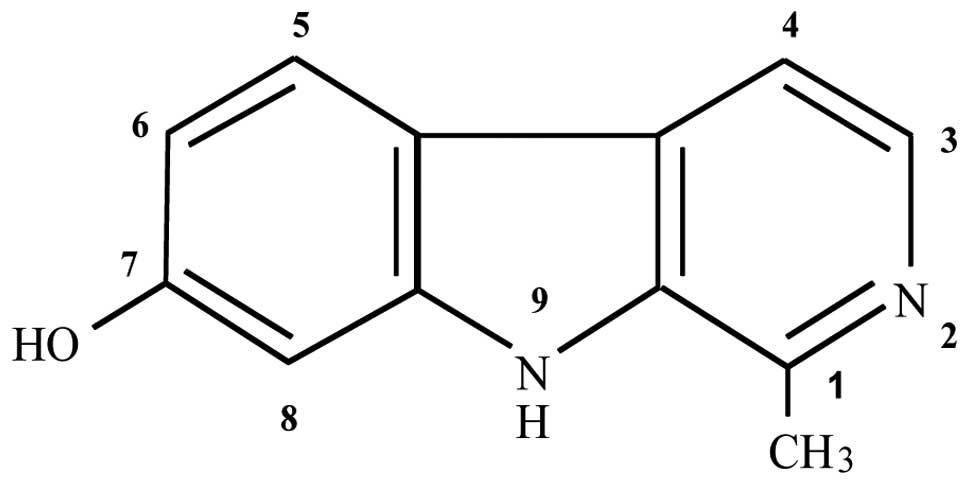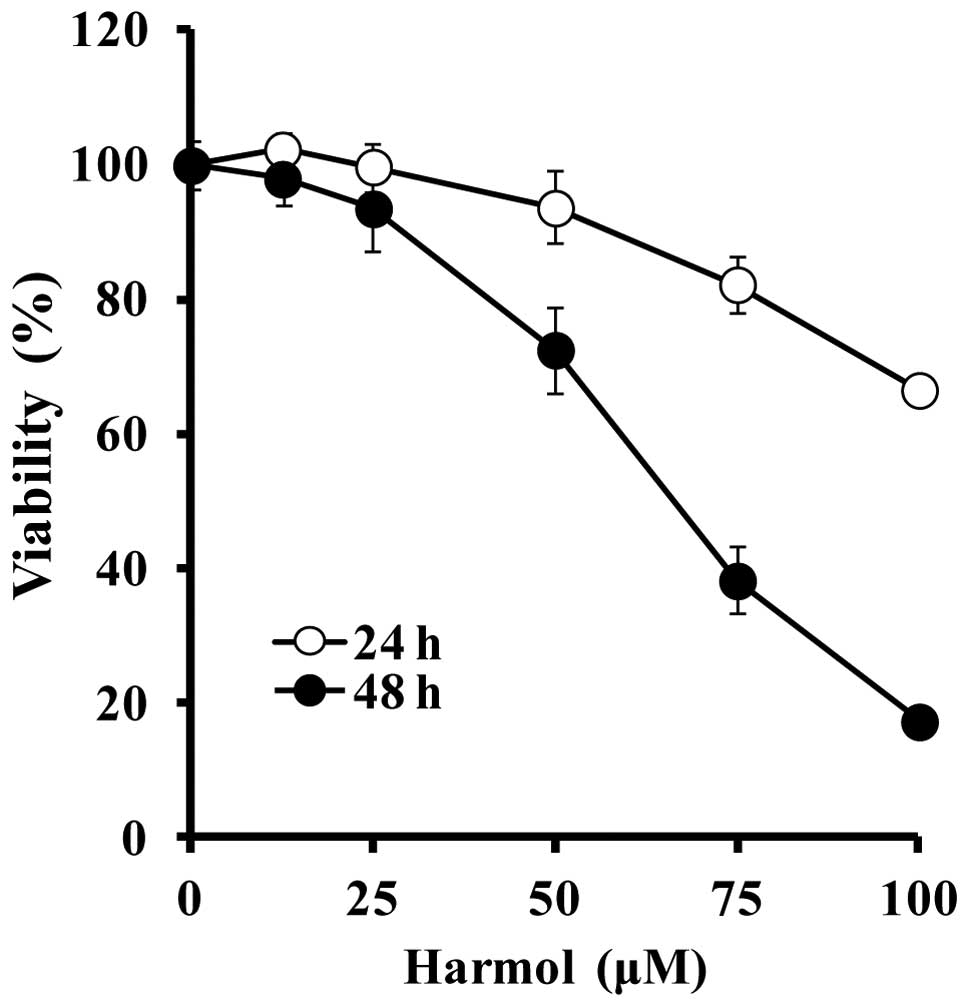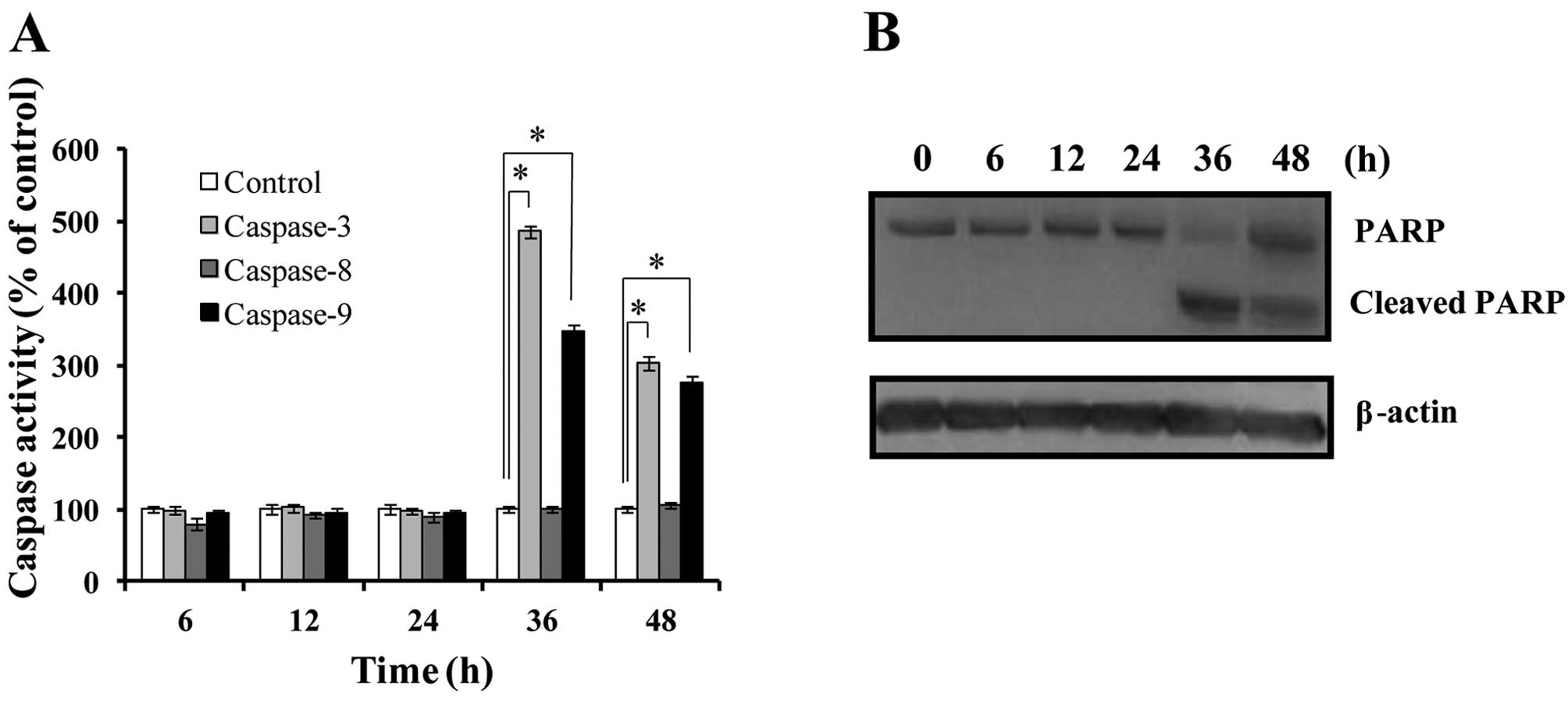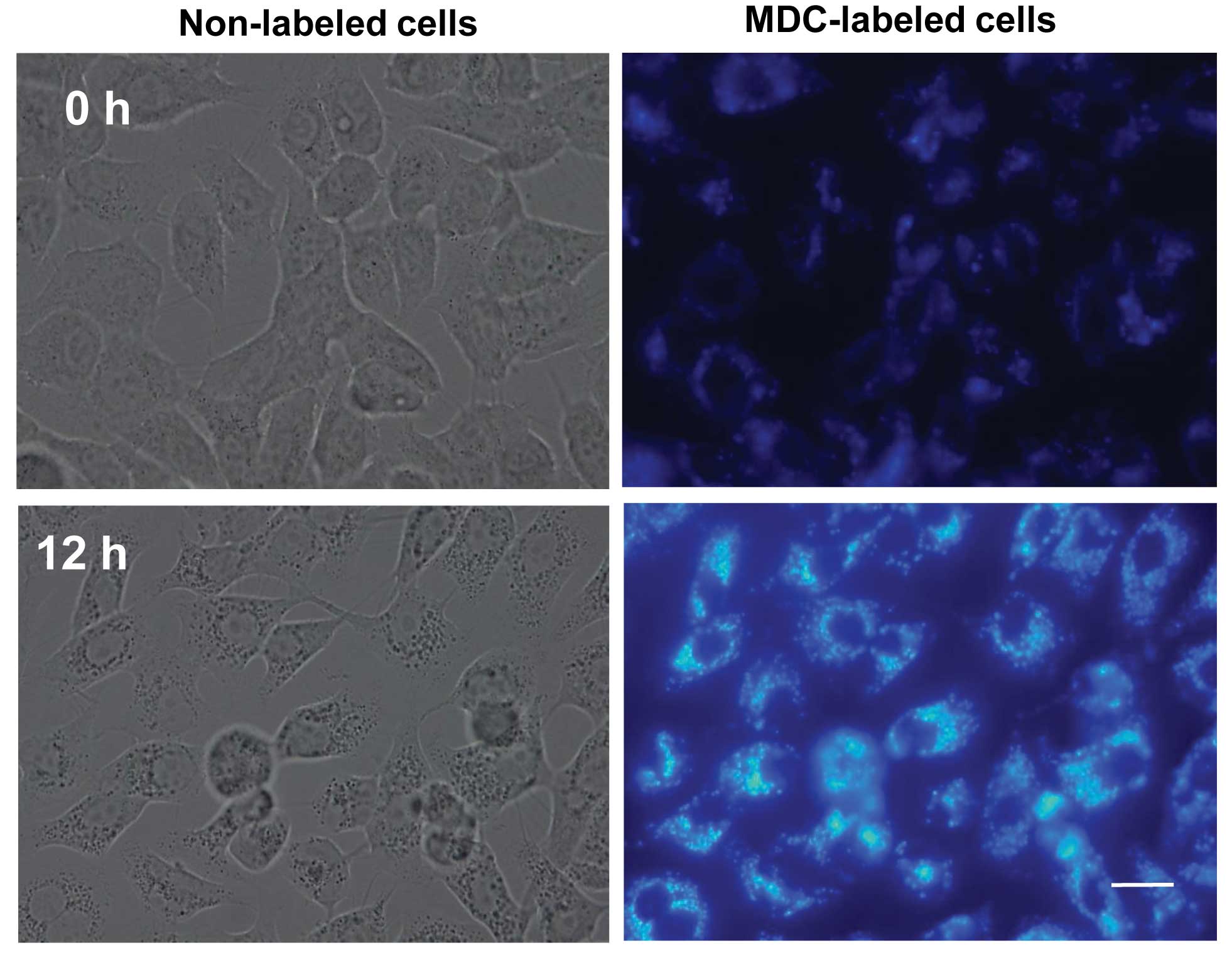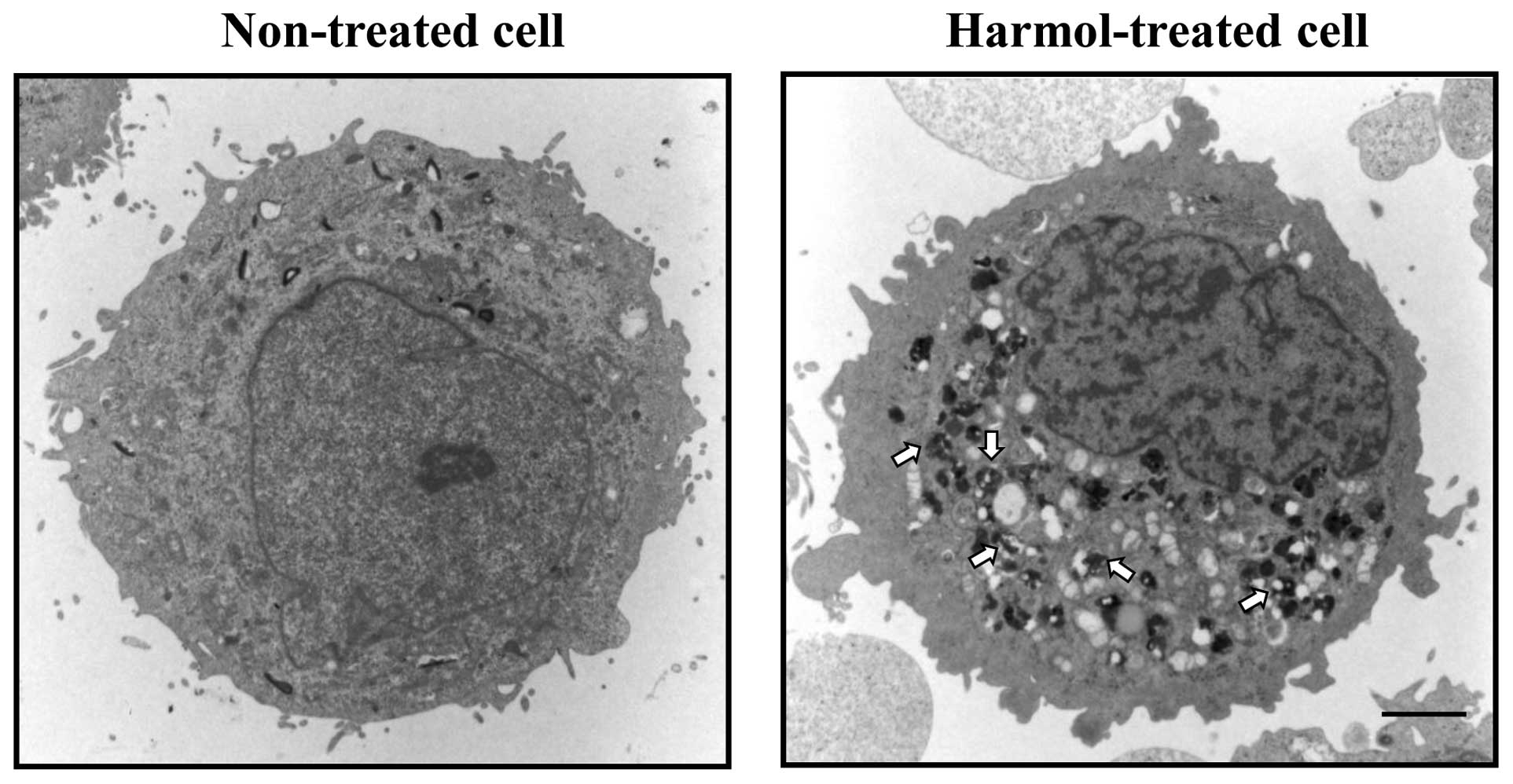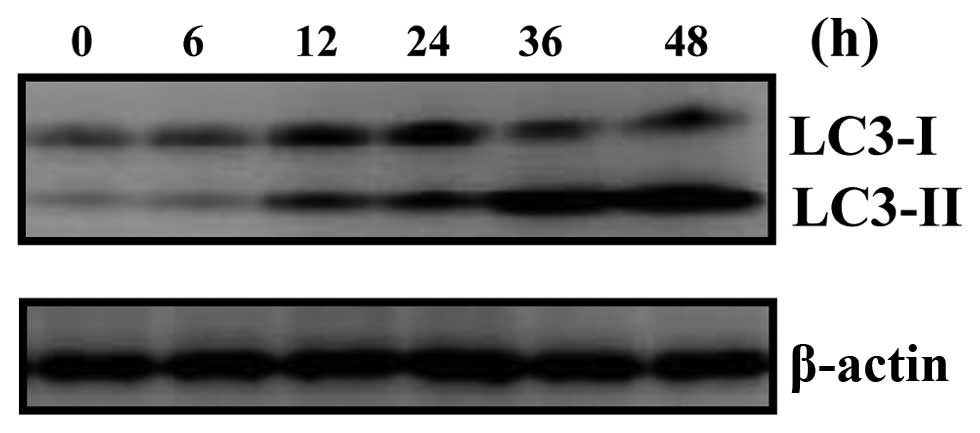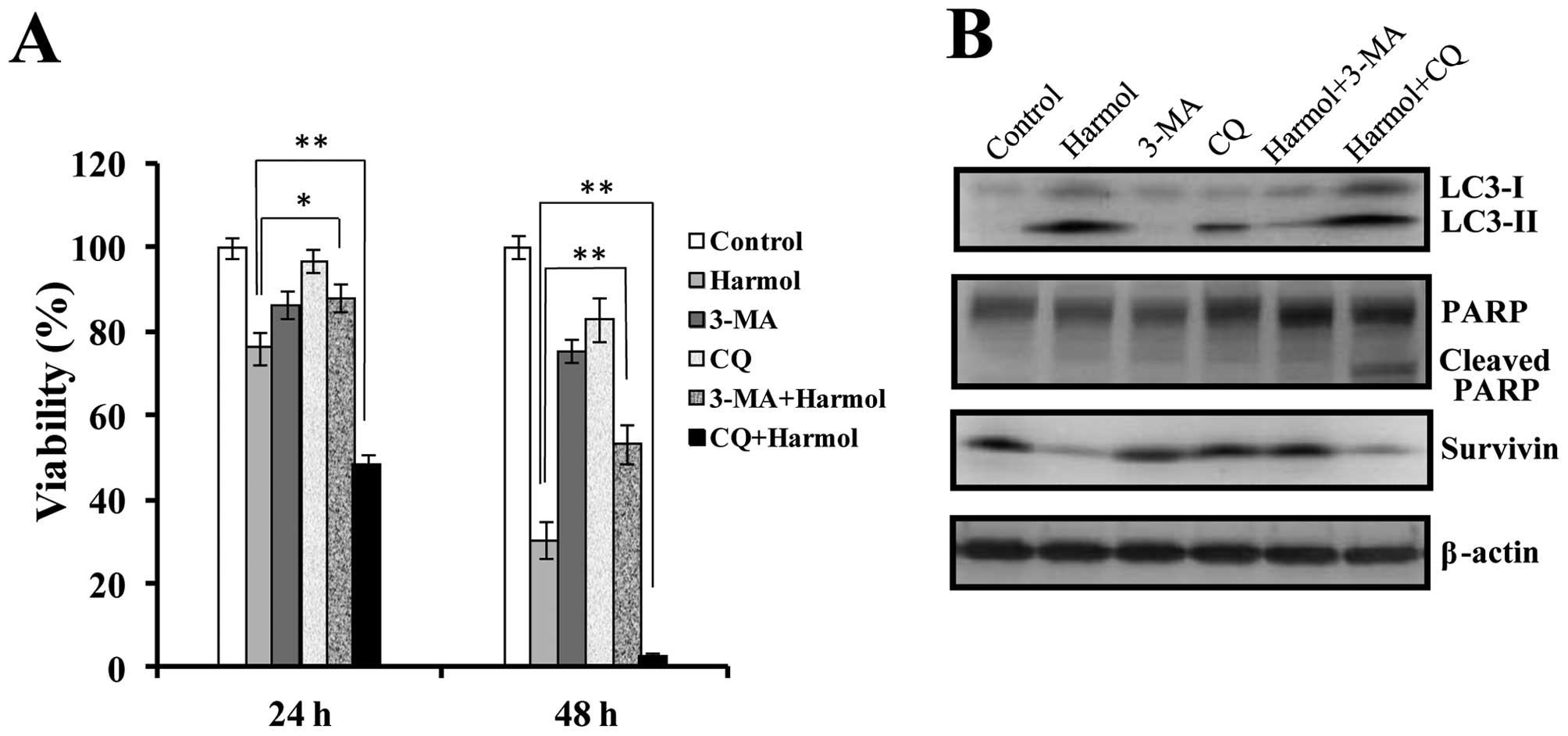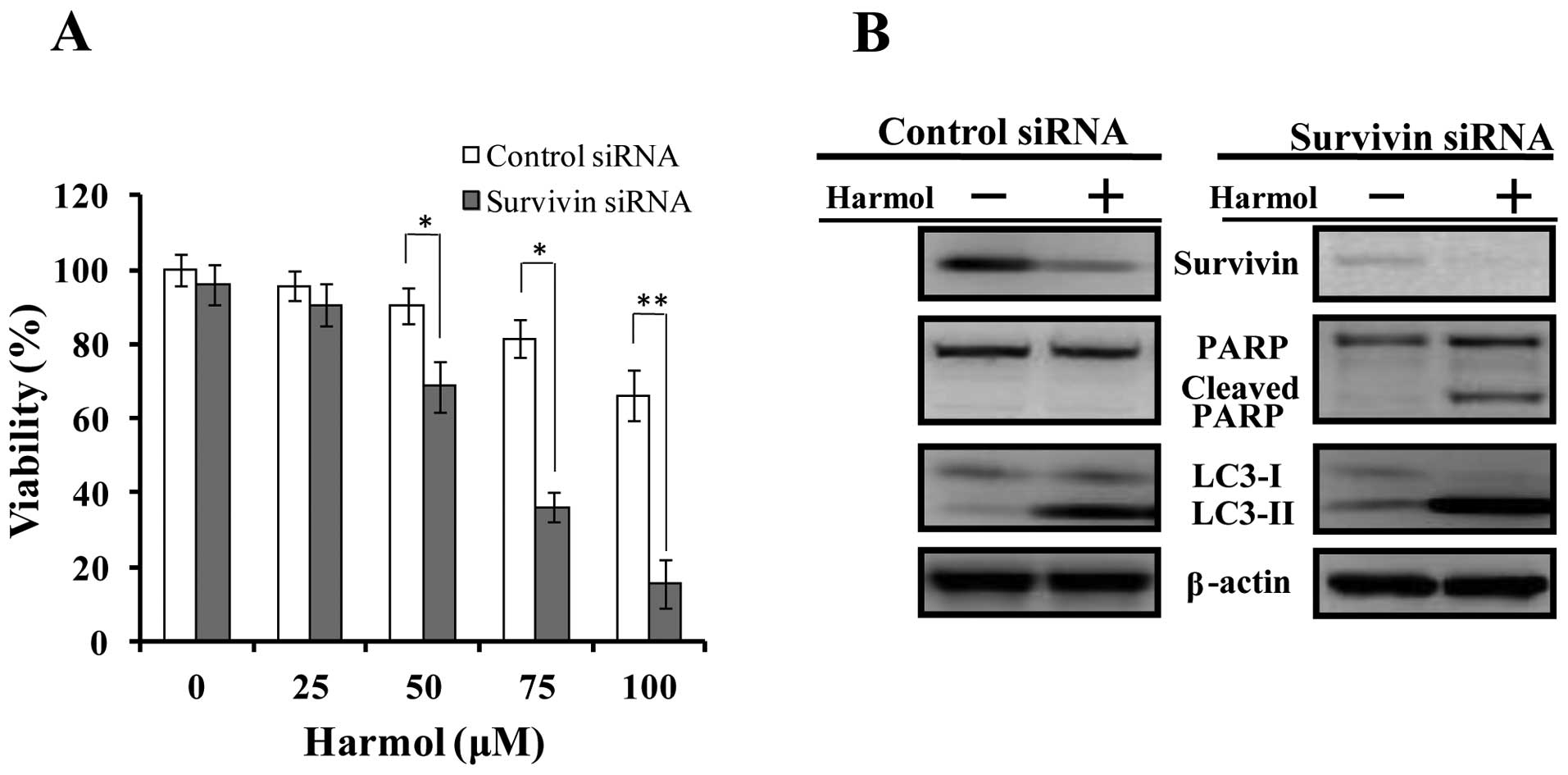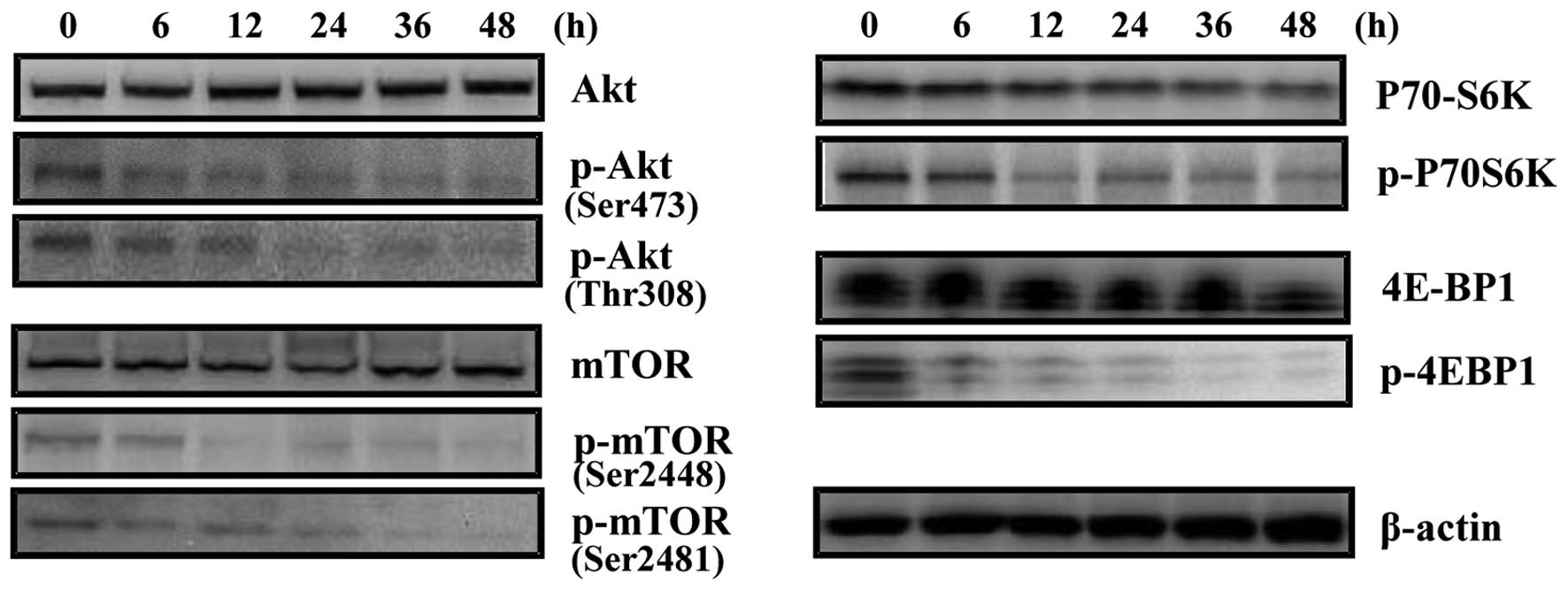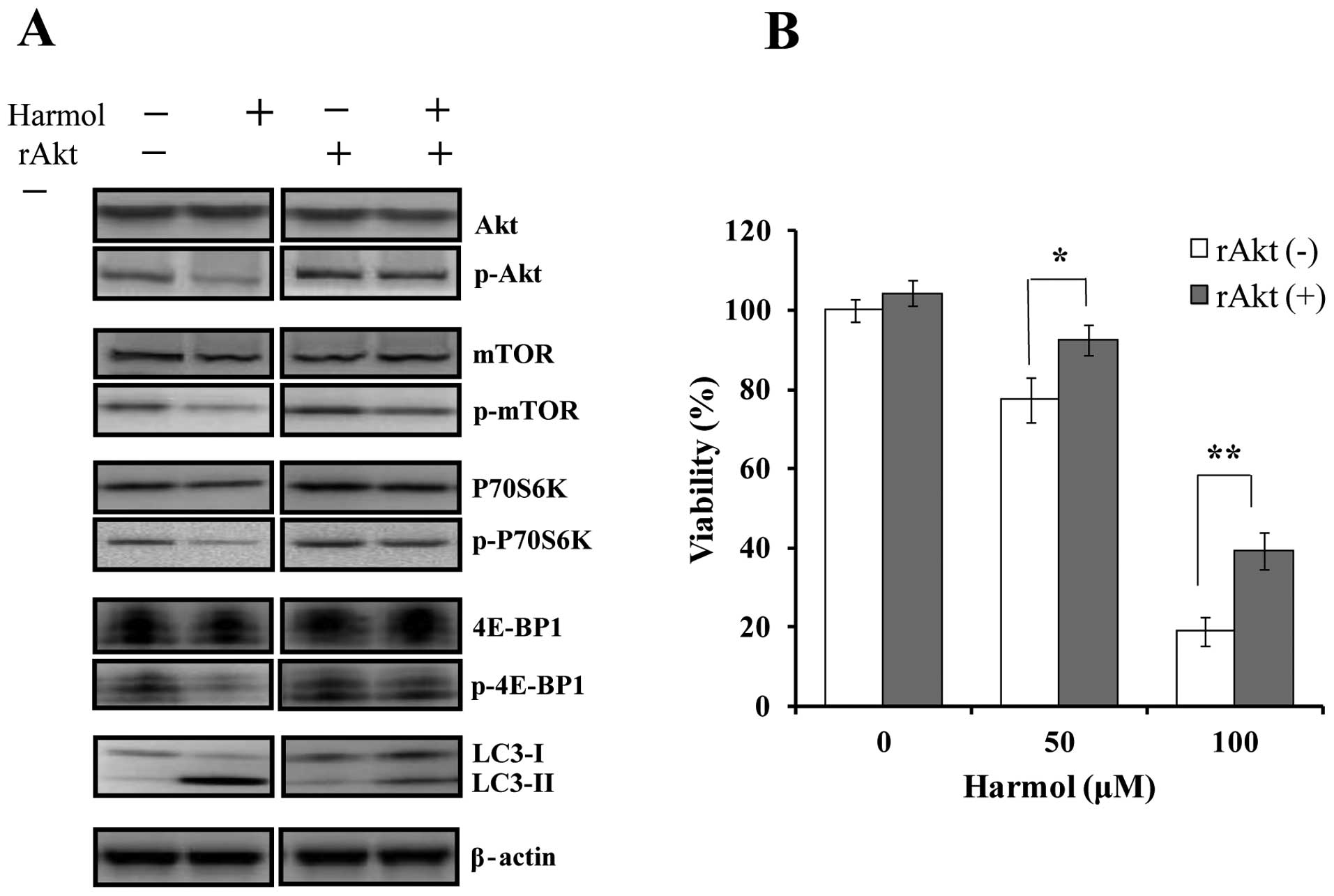|
1
|
DeAngelis LM: Brain tumors. N Engl J Med.
344:114–123. 2001. View Article : Google Scholar : PubMed/NCBI
|
|
2
|
Phillips HS, Kharbanda S, Chen R, Forrest
WF, Soriano RH, Wu TD, et al: Molecular subclasses of high-grade
glioma predict prognosis, delineate a pattern of disease
progression, and resemble stages in neurogenesis. Cancer Cell.
9:157–173. 2006. View Article : Google Scholar : PubMed/NCBI
|
|
3
|
Kanzawa T, Kondo Y, Ito H, Kondo S and
Germano I: Induction of autophagic cell death in malignant glioma
cells by arsenic trioxide. Cancer Res. 63:2103–2108.
2003.PubMed/NCBI
|
|
4
|
Fadeel B, Orrenius S and Zhivotovsky B:
Apoptosis in human disease: a new skin for the old ceremony?
Biochem Biophys Res Commun. 266:699–717. 1999. View Article : Google Scholar : PubMed/NCBI
|
|
5
|
Clarke PG: Developmental cell death:
morphological diversity and multiple mechanisms. Anat Embryol.
181:195–213. 1990. View Article : Google Scholar : PubMed/NCBI
|
|
6
|
Brown JM and Attardi LD: The role of
apoptosis in cancer development and treatment response. Nat Rev
Cancer. 5:231–237. 2005.PubMed/NCBI
|
|
7
|
Klionsky DJ and Emr SD: Autophagy as a
regulated pathway of cellular degradation. Science. 290:1717–1721.
2000. View Article : Google Scholar : PubMed/NCBI
|
|
8
|
Levine B and Klionsky DJ: Development by
self-digestion: molecular mechanisms and biological functions of
autophagy. Dev Cell. 6:463–477. 2004. View Article : Google Scholar : PubMed/NCBI
|
|
9
|
Shintani T and Klionsky DJ: Autophagy in
health and disease: a double-edged sword. Science. 306:990–995.
2004. View Article : Google Scholar : PubMed/NCBI
|
|
10
|
Gozuacik D and Kimchi A: Autophagy as a
cell death and tumor suppressor mechanism. Oncogene. 23:2891–2906.
2004. View Article : Google Scholar : PubMed/NCBI
|
|
11
|
Debnath J, Baehrecke EH and Kroemer G:
Does autophagy contribute to cell death? Autophagy. 1:66–74. 2005.
View Article : Google Scholar : PubMed/NCBI
|
|
12
|
Mizushima N, Levine B, Cuervo AM and
Klionsky DJ: Autophagy fights disease through cellular
self-digestion. Nature. 451:1069–1075. 2008. View Article : Google Scholar : PubMed/NCBI
|
|
13
|
Ogier-Denis E and Codogno P: Autophagy: a
barrier or an adaptive response to cancer. Biochim Biophys Acta.
1603:113–128. 2003.PubMed/NCBI
|
|
14
|
Corcelle E, Nebout M, Bekri S, et al:
Disruption of autophagy at the maturation step by the carcinogen
lindane is associated with the sustained mitogen-activated protein
kinase/extracellular signal-regulated kinase activity. Cancer Res.
66:6861–6870. 2006. View Article : Google Scholar
|
|
15
|
Otsuka H and Moscowitz M: Differences in
the rates of protein degradation in untransformed and transformed
cell lines. Exp Cell Res. 112:127–135. 1978. View Article : Google Scholar : PubMed/NCBI
|
|
16
|
Kirkegaad K, Taylor MP and Jacson WT:
Cellular autophagy: surrender, avoidance and subversion by
microorganisms. Nat Rev Microbiol. 2:301–314. 2004. View Article : Google Scholar : PubMed/NCBI
|
|
17
|
List PH and Hörhammer L: Hager’s Hand book
for Pharmaceutical Practice. Springer-Verlag; Berlin: 1970
|
|
18
|
Naranjo C: Psychotropic properties of the
harmala alkaloids. Ethnopharmacological Search for Psychoactive
Drugs. Efron DH, Holmestedt B and Kline NS: U.S. Public Health
Service; New York: pp. 385–392. 1967
|
|
19
|
Nadikarni KM: Indian Material Medica. 1.
Popular Pakistan Limited; Bombay: pp. 927–929. 1976
|
|
20
|
Dymock W, Warden CJ and Hooper D:
Pharmacopia Indica. 1. Harmad National Foundation of Pakistan; pp.
252–253. 1976
|
|
21
|
Khan SI, Abourashed EA, Khan IA and Walker
LA: Transport of human alkaloids across Caco-2 cell monolayers.
Chem Pharm Bull. 52:394–397. 2004. View Article : Google Scholar : PubMed/NCBI
|
|
22
|
Airaksinen MM and Kari I: β-carbolines,
psychoactive compounds in the mammalian body. Part I: occurrence,
origin and metabolism. Med Biol. 59:21–34. 1981.
|
|
23
|
Beck O and Faull KF: Concentrations of the
enantiomers of 5-hydroxymethylptoline in mammalian urine:
Implications for in vivo biosynthesis. Biochem Pharmacol.
65:97–106. 1986.PubMed/NCBI
|
|
24
|
Sobhani AM, Ebrahimi SA and Mahmoudian MJ:
An in vitro evaluation of human DNA topoisomerase I inhibition by
Peganum harmala L. seed extract and its beta-carboline
alkaloids. Pharm Pharm Sci. 5:19–23. 2002.PubMed/NCBI
|
|
25
|
Lamchouri F, Setaff A, Cherrah Y, et al:
Antitumor principles from Peganum harmala seeds. Therapie.
54:753–758. 1999.PubMed/NCBI
|
|
26
|
Kuo PC, Shi LS, Damu AG, et al: Cytotoxic
and antimalarial beta-carboline alkaloids from the roots of
Eurycoma longifolia. J Nat Prod. 66:1324–1327. 2003.
View Article : Google Scholar : PubMed/NCBI
|
|
27
|
Abe A and Yamada H: Harmol induces
apoptosis by caspase-8 activation independently of Fas/Fas ligand
interaction in human lung carcinoma H596 cells. Anticancer Drugs.
20:373–381. 2009. View Article : Google Scholar : PubMed/NCBI
|
|
28
|
Abe A, Yamada H, Moriya S and Miyazawa K:
The β-carboline alkaloid harmol induces cell death via autophagy
but not apoptosis in human non-small cell lung cancer A549 cells.
Biol Pharm Bull. 34:1264–1272. 2011.
|
|
29
|
Oliver FJ, de la Rubia G, Rolli V,
Ruiz-Ruiz MC, de Murcia G and Murcia JM: Importance of
poly(ADP-ribose) polymerase and its cleavage in apoptosis. Lesson
from an uncleavable mutant. J Biol Chem. 273:33533–33539. 1998.
View Article : Google Scholar : PubMed/NCBI
|
|
30
|
Biederbick A, Kern HF and Elsässer HP:
Monodansylcadaverine (MDC) is a specific in vivo marker for
autophagic vacuoles. Eur J Cell Biol. 66:3–14. 1995.PubMed/NCBI
|
|
31
|
Kabeya Y, Mizusima N, Ueno T, et al: LC3,
a mammalian homologue of yeast Apg8p, is localized in autophagosome
membranes after processing. EMBO J. 19:5720–5728. 2000. View Article : Google Scholar : PubMed/NCBI
|
|
32
|
Seglen PO and Gordon PB: 3-Methyladenine:
specific inhibitor of autophagic/lysosomal protein degradation in
isolated rat hepatocytes. Proc Natl Acad Sci USA. 79:1889–1892.
1982. View Article : Google Scholar : PubMed/NCBI
|
|
33
|
Kawai A, Uchiyama H, Takano S, Nakamura S
and Ohkuma S: Autophagosome-lysosome fusion depends on the pH in
acidic compartments in CHO cells. Autophagy. 3:154–157. 2007.
View Article : Google Scholar : PubMed/NCBI
|
|
34
|
Rubinsztein DC, Gestwicki JE, Murphy LO
and Klionsky DJ: Potential therapeutic applications of autophagy.
Nat Rev Drug Discov. 6:304–312. 2007. View Article : Google Scholar : PubMed/NCBI
|
|
35
|
Fu L, Kim AY, Wang X, et al: Perifosine
inhibits mammalian target of rapamycin signaling through
facilitating degradation of major components in the mTOR axis and
induces autophagy. Cancer Res. 69:8967–8976. 2009. View Article : Google Scholar : PubMed/NCBI
|
|
36
|
Viola G, Bortolozzi R, Hamel E, et al:
MG-2477, a new tubulin inhibitor, induces autophagy through
inhibition of the Akt/mTOR pathway and delayed apoptosis in A549
cells. Biochem Pharmacol. 8:16–26. 2012. View Article : Google Scholar : PubMed/NCBI
|
|
37
|
Hung JY, Hsu YL, Li CT, et al: 6-Shogaol,
an active constituent of dietary ginger, induces autophagy by
inhibiting the AKT/mTOR pathway in human non-small cell lung cancer
A549 cells. J Agric Food Chem. 57:9809–9816. 2009. View Article : Google Scholar : PubMed/NCBI
|
|
38
|
Takeuchi H, Kanzawa T, Kondo Y and Kondo
S: Inhibition of platelet-derived growth factor signaling induces
autophagy in malignant glioma cells. Br J Cancer. 90:1069–1075.
2004. View Article : Google Scholar : PubMed/NCBI
|
|
39
|
Hanahan D and Weinberg RA: The hallmarks
of cancer. Cell. 100:57–70. 2000. View Article : Google Scholar
|
|
40
|
Gross A, Yin XM, Wang K, et al: Caspase
cleaved BID targets mitochondria and is required for cytochrome c
release, while BCL-XL prevents this release but not tumor necrosis
factor-R1/Fas death. J Biol Chem. 274:1156–1163. 1999. View Article : Google Scholar : PubMed/NCBI
|
|
41
|
Zha J, Weiler S, Oh KJ, Wei MC and
Korsmeyer SJ: Posttranslational N-myristoylation of BID as a
molecular switch for targeting mitochondria and apoptosis. Science.
290:1761–1765. 2000. View Article : Google Scholar : PubMed/NCBI
|
|
42
|
Shao RG, Cao CX, Nieves-Neira W,
Dimanche-Boitrel MT, Solary E and Pommier Y: Activation of the Fas
pathway independently of Fas ligand during apoptosis induced by
camptothecin in p53 mutant human colon carcinoma cells. Oncogene.
20:1852–1859. 2001. View Article : Google Scholar : PubMed/NCBI
|
|
43
|
Deveraux Q and Reed JC: IAP family
proteins: suppressors of apoptosis. Genes Dev. 13:239–252. 1999.
View Article : Google Scholar : PubMed/NCBI
|
|
44
|
Li F, Ambrosini G, Chu EY, et al: Control
of apoptosis and mitotic spindle checkpoint by survivin. Nature.
396:580–584. 1998. View
Article : Google Scholar : PubMed/NCBI
|
|
45
|
Monzo M, Rosell R, Felip E, et al: A novel
anti-apoptosis gene: re-expression of surviving messenger RNA as a
prognosis marker in non-small-cell lung cancers. J Clin Oncol.
17:2100–2104. 1999.PubMed/NCBI
|
|
46
|
Adida C, Haioun C, Gaulard P, et al:
Prognostic significance of surviving expression in diffuse large
B-cell lymphomas. Blood. 96:1921–1925. 2000.PubMed/NCBI
|
|
47
|
Kato J, Kuwabara Y, Mitani M, et al:
Expression of surviving in esophageal cancer: correlation with the
prognosis and response to chemotherapy. Int J Cancer. 95:92–95.
2001. View Article : Google Scholar : PubMed/NCBI
|
|
48
|
Altieli DC: Survivin, cancer networks and
pathway-directed drug discovery. Nat Rev Cancer. 8:61–70. 2008.
View Article : Google Scholar : PubMed/NCBI
|
|
49
|
Levine B and Yuan J: Autophagy in cell
death: an innocent convict? J Clin Invest. 115:2679–2688. 2005.
View Article : Google Scholar : PubMed/NCBI
|
|
50
|
Guertin DA and Sabatini DM: Defining the
role of mTOR in cancer. Cancer Cell. 12:9–22. 2007. View Article : Google Scholar
|
|
51
|
Petiot A, Pattingre S, Arico S, Meley D
and Codongo P: Diversity of signaling controls of macroautophagy in
mammalian cells. Cell Struct Funct. 27:431–441. 2002. View Article : Google Scholar : PubMed/NCBI
|
|
52
|
Pattingre S, Bauvy C and Codongo P: Amino
acids interfere with the ERK1/2-dependent control of macroautophagy
by controlling the activation of Raf-1 in human colon cancer HT-29
cells. J Biol Chem. 278:16667–16674. 2003. View Article : Google Scholar : PubMed/NCBI
|
|
53
|
Meley D, Bauvy C, Houben-Weerts JH, et al:
AMP-activated protein kinase and the regulation of autophagic
proteolysis. J Biol Chem. 281:34870–34879. 2006. View Article : Google Scholar : PubMed/NCBI
|
|
54
|
Herrero-Martín G, Høyer-Hansen M,
García-García C, et al: TAK1 activates AMPK-dependent
cytoprotective autophagy in TRAIL-treated epithelial cells. EMBO J.
28:677–685. 2009.PubMed/NCBI
|
|
55
|
Djavaheri-Mergny M, Maiuri MC and Kroemer
G: Cross talk between apoptosis and autophagy by caspase-mediated
cleavage of Beclin 1. Oncogene. 29:1717–1719. 2010. View Article : Google Scholar : PubMed/NCBI
|
|
56
|
Zhou F, Yang Y and Xing D: Bcl-2 and
Bcl-xL play important roles in the crosstalk between autophagy and
apoptosis. FEBS J. 278:403–413. 2011. View Article : Google Scholar : PubMed/NCBI
|
|
57
|
Lin CC, Lee CW, Chu TH, et al:
Transactivation of Src, PDGF receptor, and Akt is involved in
IL-1beta-induced ICAM-1 expression in A549 cells. J Cell Physiol.
211:771–780. 2007. View Article : Google Scholar : PubMed/NCBI
|
|
58
|
Russo P, Catassi A, Cesario A and Servent
D: Development of novel therapeutic strategies for lung cancer:
targeting the cholinergic system. Curr Med Chem. 13:3493–3512.
2006. View Article : Google Scholar : PubMed/NCBI
|
|
59
|
Akca H, Tani M, Hishida T, Matsumoto S and
Yokota J: Activation of the AKT and STAT3 pathways and prolonged
survival by a mutant EGFR in human lung cancer cells. Lung Cancer.
54:25–33. 2006. View Article : Google Scholar : PubMed/NCBI
|
|
60
|
Kishimoto H, Ohteki T, Yajima N, et al:
The Pten/PI3K pathway governs the homeostasis of Valpha14iNKT
cells. Blood. 109:3316–3324. 2007. View Article : Google Scholar : PubMed/NCBI
|
|
61
|
Takeuchi H, Kondo Y, Fujiwara K, et al:
Synergistic augmentation of rapamycin-induced autophagy in
malignant glioma cells by phosphatidylinositol 3-kinase/protein
kinase B inhibitors. Cancer Res. 65:3336–3346. 2005.PubMed/NCBI
|
|
62
|
Rommelspacher H, Nanz C, Borbe HO, Fehske
KJ, Müller WE and Wollert U: 1-Methyl-beta-carboline (harmane), a
potent endogenous inhibitor of benzodiazepine receptor binding.
Naunyn Schmiedebergs Arch Pharmacol. 314:97–100. 1980. View Article : Google Scholar : PubMed/NCBI
|
|
63
|
Ho BT: Pharmacological and biochemical
studies with beta-carboline analogs. Curr Dev Psychopharmacol.
4:151–177. 1977.PubMed/NCBI
|
|
64
|
Poirier LJ, Sourkes TL, Bouvier G, Boucher
R and Carabin S: Striatal amines, experimental tremor and the
effect of harmaline in the monkey. Brain. 89:37–52. 1966.
View Article : Google Scholar : PubMed/NCBI
|
|
65
|
Bruinvels J and Sourkes TL: Influence of
drugs on the temperature-lowering effect of harmaline. Eur J
Pharmacol. 4:31–39. 1969. View Article : Google Scholar
|
|
66
|
Zetler G, Back G and Iven H:
Pharmacokinetics in the rat of the hallucinogenic alkaloids harmine
and harmaline. Naunyn Shemiedebergs Arch Pharmacol. 285:273–292.
1974. View Article : Google Scholar : PubMed/NCBI
|
|
67
|
Grella B, Dukat M, Young R, et al:
Investigation of hallucinogenic and related beta-carbolines. Drug
Alcohol Depend. 50:99–107. 1998. View Article : Google Scholar : PubMed/NCBI
|
|
68
|
Udenfriend S, Wiycop B, Redfield BG and
Weissbach H: Studies with reversible inhibitors of monoamine
oxidase: harmaline and related compounds. Biochem Pharmacol.
1:160–165. 1958. View Article : Google Scholar
|
|
69
|
McIsaac WM and Estevez V: Structure-action
relationship of beta-carbolines as monoamine oxidase inhibitors.
Biochem Pharmacol. 15:1625–1627. 1966. View Article : Google Scholar : PubMed/NCBI
|
|
70
|
Loew GH, Nienow J, Lawson JA, Toll L and
Uyeno ET: Theoretical structure-activity studies of beta-carboline
analogs. Requirements for benzodiazepine receptor affinity and
antagonist activity. Mol Pharmacol. 28:17–31. 1985.
|
|
71
|
Kim H, Sablin SO and Ramsay RR: Inhibition
of monoamine oxidase A by β-carboline derivatives. Arch Biochem
Biophys. 337:137–142. 1997.
|
|
72
|
Gunn JA: Relations between chemical
constitution, pharmacological actions, and therapeutic uses in the
harmine group of alkaloids. Arch Int Pharmacodyn. 50:379–396.
1935.
|
|
73
|
Zetler G, Singbart G and Schlosser L:
Cerebral pharmacokinetics of tremor-producing harmala and iboga
alkaloids. Pharmacology. 7:237–248. 1972. View Article : Google Scholar : PubMed/NCBI
|
|
74
|
Yu AM, Idle JR, Krausz KW, Küpfer A and
Gonzalez FJ: Contribution of individual cytochrome P450 isozymes to
the O-demethylation of the psychotropic beta-carboline alkaloids
harmaline and harmine. J Pharmacol Exp Ther. 305:315–322. 2003.
View Article : Google Scholar : PubMed/NCBI
|
|
75
|
Slotkin TA, DiStefano V and Au WY: Blood
levels and urinary excretion of harmine and its metabolites in man
and rats. J Pharmacol Exp Ther. 173:26–30. 1970.PubMed/NCBI
|















